9 mins read
Pregnancy & Hormones: Changes and Symptoms

- What hormones are needed to get pregnant?
- What happens to female hormones during pregnancy?
- The second trimester
- The third trimester
What hormones are needed to get pregnant?
There are lots of hormones that play a crucial role in female fertility. Each hormone has an important role, from helping you conceive to growing the baby and relaxing you ready for childbirth. These 4 hormones are important for fertility:
- Follicle-stimulating hormone (FSH): FSH is produced by the pituitary gland and plays a critical role in the development and maturation of ovarian follicles, which contain the eggs.
- Luteinizing hormone (LH): LH is also produced by the pituitary gland and triggers ovulation, which is the release of a mature egg from the ovary.
- Oestrogen: Oestrogen is produced by the ovaries and plays a role in the development of the uterine lining and the regulation of the menstrual cycle.
- Progesterone: Progesterone helps prepare the uterus to grow during pregnancy and stops it from having contractions.
All 4 of these hormones work together in a complex network across a woman’s menstrual cycle, rising and falling throughout the cycle in a characteristic pattern. Any disruptions in the balance of these hormones can lead to infertility or difficulty getting pregnant.
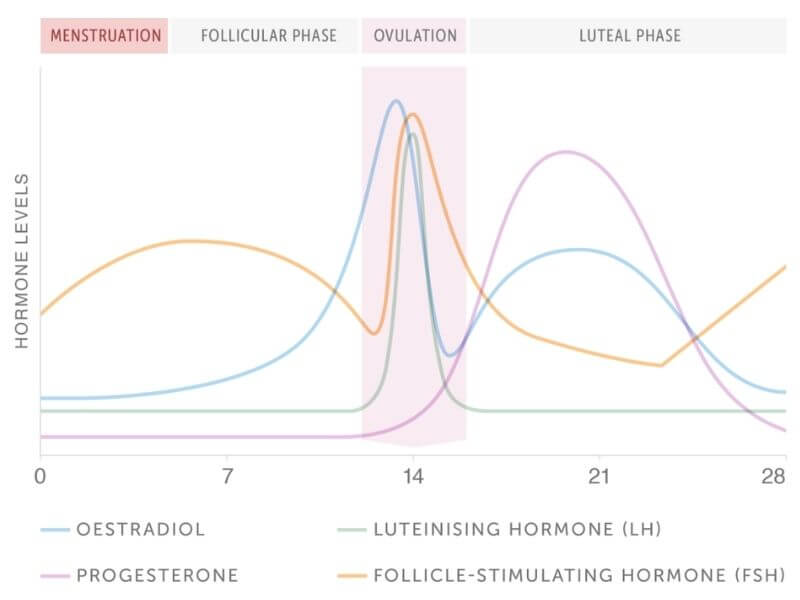
You can check your hormone levels from the comfort of your home with our MyFORM Female Hormone Mapping test. It checks 8 crucial hormones required for pregnancy, including FSH, LH, Oestrogen and Progesterone.
What happens to female hormones during pregnancy?
The first trimester
During the first trimester of pregnancy, female hormones undergo significant changes to support the developing foetus and prepare the body for the later stages of pregnancy.
One of the most significant changes is the rise in progesterone levels. Progesterone helps to thicken and maintain the lining of the womb for implantation and early part of embryo development before the placenta develops. It also helps to prevent contractions that could lead to preterm labour and relaxes smooth muscle tissue throughout the body, allowing for the growth and movement of the foetus.
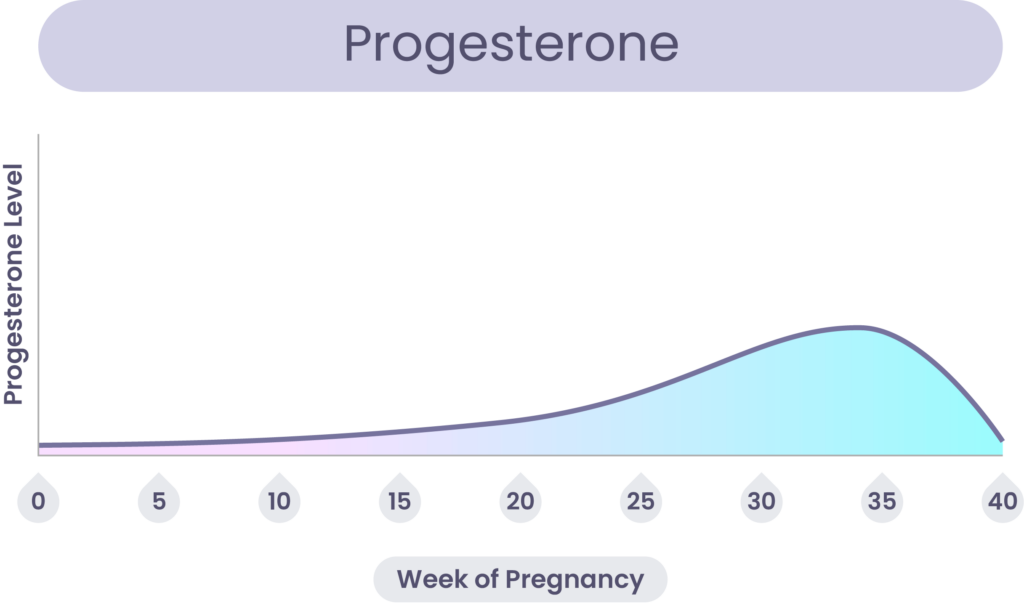
Oestrogen levels also increase during the first trimester, particularly in the early weeks of pregnancy. Oestrogen helps to stimulate the growth and development of the foetus and promotes the growth of breast tissue in preparation for lactation.
Another hormone that plays a key role in the first trimester is human chorionic gonadotropin (hCG). This hormone is produced by the cells surrounding the developing embryo and helps to maintain the pregnancy by stimulating the ovaries to continue producing progesterone.
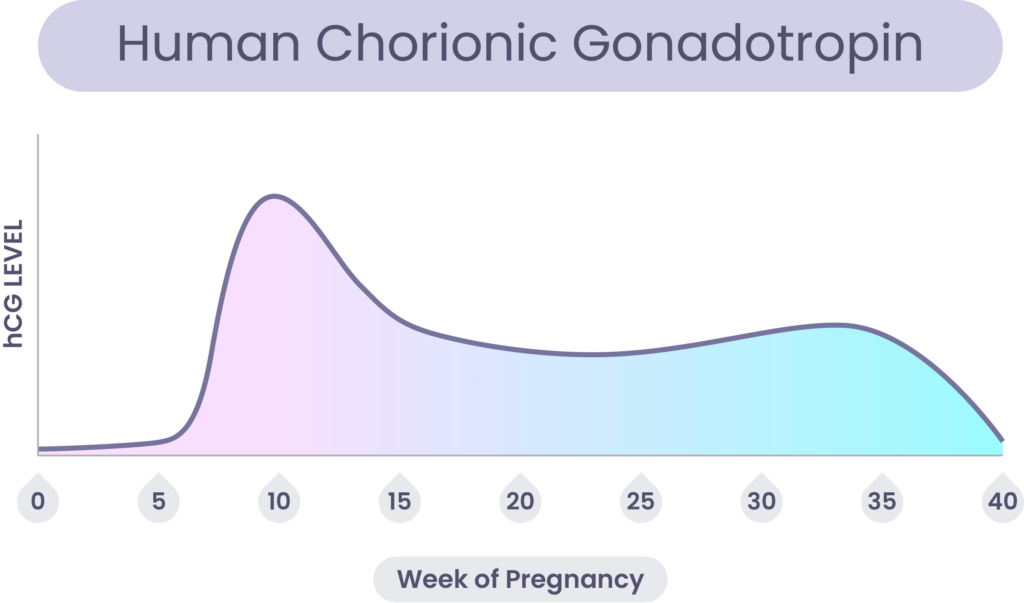
In addition to these hormones, there are other changes that occur during the first trimester. For example, blood volume increases, and the heart pumps harder to circulate this extra blood. The digestive system may slow down, leading to constipation and heartburn, and the immune system may be suppressed to prevent the mother’s body from rejecting the developing foetus.
Overall, the first trimester of pregnancy is a time of significant hormonal changes that help to support the growth and development of the foetus and prepare the mother’s body for childbirth. These changes can also lead to common symptoms of early pregnancy, such as nausea, fatigue, and mood swings.
The second trimester
During the second trimester of pregnancy, female hormones continue to undergo significant changes to support the growing foetus and prepare the body for childbirth.
Progesterone levels remain high during this trimester to help maintain the pregnancy and prevent contractions that could lead to preterm labour. However, progesterone levels begin to decrease slightly as the pregnancy progresses, allowing the uterus to begin contracting in preparation for labour.
Oestrogen levels also continue to rise during the second trimester. Oestrogen helps to promote the growth and development of the foetus, including the development of the respiratory and digestive systems. It also helps to maintain the health of the placenta, which is responsible for supplying the foetus with oxygen and nutrients.
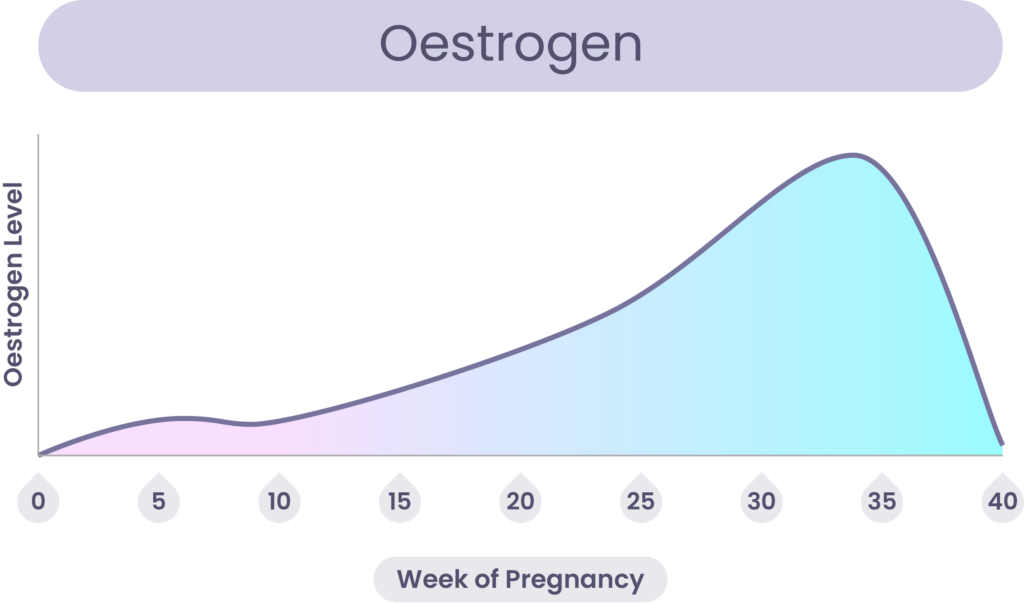
In addition to progesterone and oestrogen, other hormones play a role during the second trimester. For example, the hormone Relaxin is a reproductive hormone produced by the ovaries and the placenta. It loosens and relaxes the muscles, joints and ligaments during pregnancy to help your body stretch. Relaxin also helps the body prepare for delivery by loosening the muscles and ligaments in your pelvis. This hormone can also cause some women to experience joint pain or discomfort.
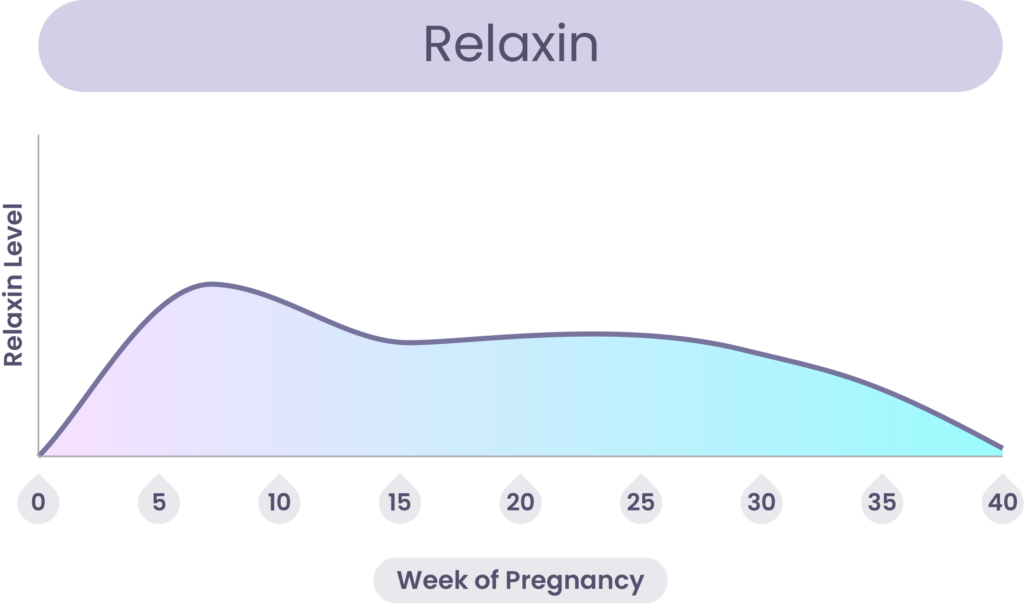
Another hormone that increases during the second trimester is prolactin. Prolactin helps to prepare the breasts for lactation and promotes milk production.
Overall, the second trimester is a time of continued hormonal changes that support the growth and development of the foetus and prepare the body for childbirth and breastfeeding. Women may also experience fewer symptoms during this trimester, such as nausea and fatigue, and may feel more energy and an increase in appetite.
The third trimester
During the third trimester of pregnancy, female hormones continue to play a vital role in supporting the growth and development of the foetus and preparing the body for childbirth.
Progesterone levels begin to decrease during this trimester, which can cause the uterus to become more irritable and contractions to become more frequent. These contractions are a normal part of the body’s preparation for labour and delivery.
Oestrogen levels also continue to rise during the third trimester. Oestrogen helps to promote the growth and development of the foetus, including the development of the lungs, brain, and nervous system. It also helps to maintain the health of the placenta and the blood vessels in the uterus.
Another hormone that increases during the third trimester is oxytocin. Oxytocin is known as the “love hormone” and plays a crucial role in childbirth. It helps to stimulate contractions and can also promote feelings of bonding and attachment between the mother and baby.
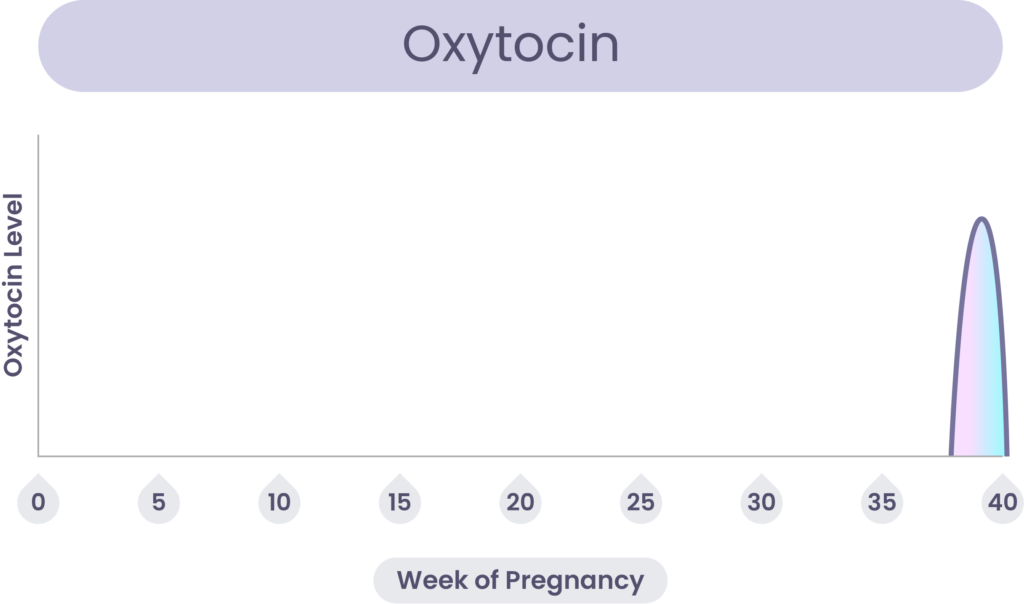
In addition to these hormones, other changes occur in the female body during the third trimester. For example, the weight of the growing foetus can put pressure on the bladder, causing frequent urination. The digestive system may also slow down further, leading to constipation and heartburn. Additionally, the skin may stretch and become itchy, and the breasts may produce colostrum, a nutrient-rich fluid that is the first milk produced after delivery.
Overall, the third trimester is a time of significant hormonal changes as the body prepares for labour and delivery. These changes can cause a range of physical symptoms and discomforts, but they are a normal part of the pregnancy process.

Symptoms related to pregnancy
Pregnancy is a unique and exciting time for many women. As the body undergoes significant changes to support the growth and development of a new life, there are several common symptoms that many women experience during pregnancy. Some of these symptoms include:
- Nausea and vomiting: Also known as morning sickness, nausea and vomiting are common symptoms that affect many women during the first trimester of pregnancy.
- Fatigue: The body is working hard to support the growth and development of the foetus, which can lead to feelings of exhaustion and fatigue.
- Breast changes: The breasts may become swollen, tender, or sore due to hormonal changes that occur during pregnancy.
- Frequent urination: The growing foetus can put pressure on the bladder, leading to more frequent trips to the bathroom.
- Constipation: The digestive system may slow down during pregnancy, which can lead to constipation and discomfort.
- Heartburn: As the uterus expands, it can put pressure on the stomach and lead to heartburn and acid reflux.
- Mood changes: Hormonal changes during pregnancy can cause mood swings, anxiety, and depression in some women. Depression during pregnancy is called perinatal depression, but you may experience depression after childbirth too, called postnatal depression.
- Braxton Hicks contractions: These are mild contractions that can occur in the second or third trimester of pregnancy and are a normal part of the body’s preparation for labour.
- Swelling: Some women may experience swelling in their hands, feet, and legs as a result of increased fluid retention during pregnancy.
- Pelvic pain: Some women may experience pelvic pain during pregnancy, other referred to as pregnancy-related pelvic girdle pain (PGP) or symphysis pubis dysfunction (SPD).
It’s important to note that not all women experience these symptoms and that the severity of symptoms can vary from woman to woman. If you are experiencing any symptoms that are concerning or interfering with your daily life, it’s important to speak with your healthcare provider.
Preparing for pregnancy
Preparing for pregnancy can involve several steps to ensure that you and your partner are in the best possible health to support the growth and development of a healthy baby. Some of the ways to prepare for pregnancy include:
- Schedule a preconception checkup: Schedule a visit with your healthcare provider before trying to conceive to discuss any medical concerns, review your medical history, and receive any necessary vaccinations.
- Start taking folic acid: Taking a daily folic acid supplement before and during pregnancy can reduce the risk of neural tube defects in the developing foetus.
- Maintain a healthy weight: Being underweight or overweight can impact fertility and increase the risk of pregnancy complications. Aim to maintain a healthy weight through a balanced diet and regular exercise.
- Quit smoking and limit alcohol intake: Smoking and excessive alcohol consumption can negatively impact fertility and increase the risk of pregnancy complications. Quit smoking and limit alcohol intake to improve your chances of conceiving and support a healthy pregnancy.
- Manage chronic health conditions: If you have any chronic health conditions, such as diabetes or hypertension, work with your healthcare provider to manage them effectively before and during pregnancy.
- Stay up-to-date on immunisations: Make sure you are up-to-date on all necessary immunizations, including the flu shot and the Tdap vaccine, to protect yourself and your developing baby.
- Reduce stress: High levels of stress can negatively impact fertility and increase the risk of pregnancy complications. Practice stress-reducing techniques, such as meditation, yoga, or deep breathing exercises, to help manage stress levels.
Preparing for pregnancy can help increase the chances of a healthy pregnancy and baby. If you have any concerns or questions about preparing for pregnancy, speak with your midwife provider for personalised guidance and advice.
- Health scores calculated
Close
This information has been medically written by Dr Thom Phillips
Thom works in NHS general practice and has a decade of experience working in both male and female elite sport. He has a background in exercise physiology and has published research into fatigue biomarkers.

Dr Thom Phillips
Head of Clinical Services
Related articles
Like this article? Here are some more based on similar topics.




